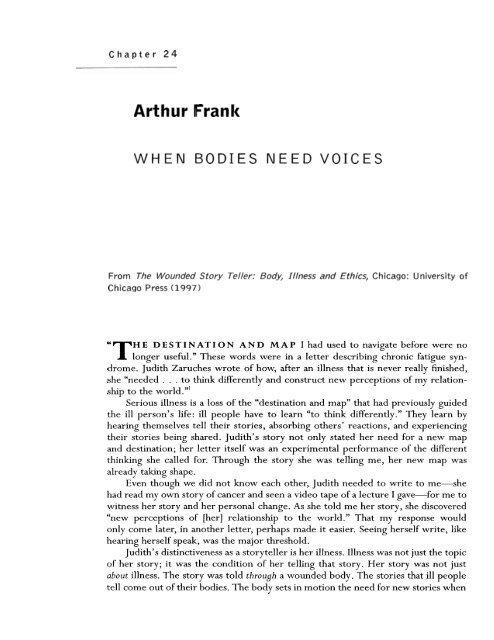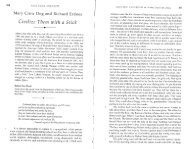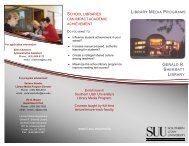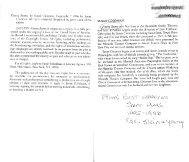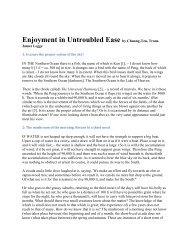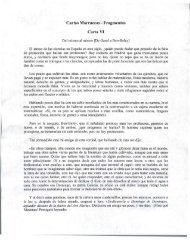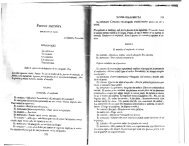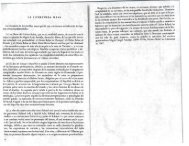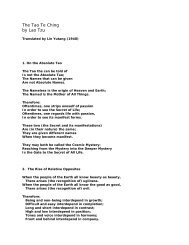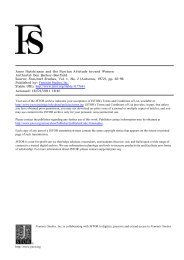Arthur Frank
Arthur Frank
Arthur Frank
Create successful ePaper yourself
Turn your PDF publications into a flip-book with our unique Google optimized e-Paper software.
Chapter 24<br />
<strong>Arthur</strong> <strong>Frank</strong><br />
WHEN BODIES NEED VOICES<br />
From The Wounded Story Teller: Body, Illness and Ethics, Chicago: University of<br />
Chicago Press (1997)<br />
"T<br />
H E D E ST I N AT I 0 N A N D M A P I had used to navigate before were no<br />
longer useful." These words were in a letter describing chronic fatigue syn-<br />
drome. Judith Zaruches wrote of how, after an illness that is never really finished,<br />
she "needed . . . to think differently and construct new perceptions of my relation-<br />
ship to the world."'<br />
Serious illness is a loss of the "destination and map" that had previously guided<br />
the ill person's life: ill people have to learn "to think differently." They learn by<br />
hearing themselves tell their stories, absorbing others' reactions, and experiencing<br />
their stories being shared. Judith's story not only stated her need for a new map<br />
and destination; her letter itself was an experimental performance of the different<br />
thinking she called for. Through the story she was telling me, her new map was<br />
already talung shape.<br />
Even though we did not know each other, Judith needed to write to me-she<br />
had read my own story of cancer and seen a video tape of a lecture I gave--for me to<br />
witness her story and her personal change. As she told me her story, she discovered<br />
"new perceptions of [her] relationship to the world." That my response would<br />
only come later, in another letter, perhaps made it easier. Seeing herself write, like<br />
hearing herself speak, was the major threshold.<br />
Judith's distinctiveness as a storyteller is her illness. Illness was not just the topic<br />
of her story; it was the condition of her telling that story. Her story was not just<br />
about illness. The story was told through a wounded body. The stories that ill people<br />
tell come out of their bodies. The body sets in motion the need for new stories when
WHEN BODIES NEED VOICES 305<br />
its disease disrupts the old stories. The body, whether still diseased or recovered, is<br />
simultaneously cause, topic, and instrument of whatever new stories are told.2<br />
These embodied stories have two sides, one personal and the other social.<br />
The personal issue of telling stories about illness is to give voice to the body, so<br />
that the changed body can become once again familiar in these stories. But as the<br />
language of the story seeks to make the body familiar, the body eludes language. T~<br />
paraphrase Martin Buber, the body "does not use speech, yet begets it."' The ill body<br />
is certainly not mute-it speaks eloquently in pains and symptoms-but it is<br />
inarticulate. We must speak for the body, and such speech is quickly frustrated:<br />
speech presents itself as being about the body rather than of it. The body is often<br />
alienated, literally "made strange," as it is told in stories that are instigated by a need<br />
to make it familiar.<br />
The alternative to this frustration is to reduce the body to being the mere topic<br />
of the story and thus to deny the story's primary condition: the teller has or has had<br />
a disease. That the teller's diseased body shapes the illness story should be selfevident.<br />
Only a caricature Cartesianism would imagine a head, compartmentalized<br />
away from the disease, talking about the sick body beneath it. The head is tied to that<br />
body through pathways that science is only beginning to comprehend, but the<br />
general principle is clear: the mind does not rest above the body but is diffused<br />
throughout it.<br />
But actually hearing traces of the body in the story is not easy. Observing what<br />
stories say about the body is a familiar sort of listening; describing stories as told<br />
through the body requires another level of attention. This book attempts to evoke<br />
this other level of attention: How can we make sense of illness stories as being told<br />
through the diseased body?<br />
The ill body's articulation in stories is a personal task, but the stories told by the<br />
ill are also social. The obvious social aspect of stories is that they are told to someone,<br />
whether that other person is immediately present or not. Even messages in a bottle<br />
imply a potential reader. The less evident social aspect of stories is that people do<br />
not make up their stories by themselves. The shape of the telling is molded by all the<br />
rhetorical expectations that the storyteller has been internalizing ever since he first<br />
heard some relative describe an illness, or she saw her first television commercial<br />
for a non-prescription remedy, or he was instructed to "tell the doctor what hurts"<br />
and had to figure out what counted as the story that the doctor wanted to hear.<br />
From their families and friends, from the popular culture that surrounds them, and<br />
from the stories of other ill people, storytellers have learned formal structures<br />
of narrative, conventional metaphors and imagery, and standards of what is and is<br />
not appropriate to tell. Whenever a new story is told, these rhetorical expectations<br />
are reinforced in some ways, changed in others, and passed on to affect others'<br />
5<br />
stories. . . .<br />
Postmodern illness<br />
The prefix "post" is not quite right; I do not propose any strict periodization of the<br />
modern and the postmodern. I do believe that over a period of time, perhaps the last<br />
twenty years, how people think about themselves and their worlds has changed
306 ARTHUR FRANK<br />
enough to deserve a label, and the most accepted label-increasingly diffused in<br />
journalism and popular culture-is postmodernism.6 ~ecause of the number of<br />
intellectual agendae that employ some version of this label, I prefer "postmodern<br />
times." The times that contemporary illness stories are told in, which are also the<br />
times I am writing in, have changed fairly recently.<br />
Albert Borgrnann's title Crossing the Postmodern ~ivide~ provides a particularly<br />
useful metaphor. Journeys cross divides. Once on the other side, the traveler<br />
remains the same person, carrying the same baggage. But on the other side of<br />
certain divides, the traveler senses a new identity; that same baggage now seems<br />
useful for new purposes. Fundamental assumptions that give life its particular<br />
meaning have changed. Postmodernity is such a crossing, occurring when the same<br />
ideas and actions are overlaid with different meanings. Sometimes these differences<br />
of having crossed the divide are clear, but more often they are subtle: things just feel<br />
different. Illness has come to feel different during the last twenty years, and today<br />
the sum of those differences can be labeled postmodernism. I make no attempt to<br />
define postmodernism; the utility of that term lies only in thick descriptions of the<br />
feel of the differences.<br />
A useful, if simplified, evocation of the shift from the premodern experience of<br />
illness to modernity is provided by a North African woman quoted by Pierre<br />
Bourdieu in his anthropological research. That Bourdieu recorded this quotation<br />
from a living person is a reminder of the proximity and overlap of the premodern,<br />
modern, and postmodern. "In the old days," the woman said, "folk didn't know what<br />
illness was. They went to bed and they died. It's only nowadays that we've learned<br />
words like liver, lung, stomach, and I don't know what!"'<br />
Of course premodern people had rich descriptors for disease and its remedies;<br />
ethnomedicine was and is highly specific. But I interpret the speaker's closing<br />
exclamation as indicating being overwhelmed: she literally doesn't know what. The<br />
specialized medical terms that the woman claims her people have only recently<br />
learned overwhelm her experience because they come from elsewhere. The shift to<br />
modernity crosses a divide into a medical culture that is foreign to this woman's<br />
experience of illness.<br />
The modern experience of illness begins when popular experience is overtaken<br />
by technical expertise, including complex organizations of treatment. Folk no longer<br />
go to bed and die, cared for by family members and neighbors who have a talent for<br />
healing. Folk now go to paid professionals who reinterpret their pains as symptoms,<br />
using a specialized language that is unfamiliar and overwhelming. As patients, these<br />
folk accumulate entries on medical charts which in most instances they are neither<br />
able nor allowed to read; the chart becomes the official story of the illness. Other<br />
stories proliferate. I11 people tell family and friends versions of what the doctor<br />
said, and these others reply by telling experiences that seem to be similar: both<br />
experiences they have had themselves and ones heard from others. Illness becomes a<br />
circulation of stories, professional and lay, but not all stories are equal.<br />
The story of illness that trumps all others in the modern period is the medical<br />
narrative. The story told by the physician becomes the one against which others are<br />
ultimately judged true or false, useful or not. I will discuss Talcott Parsons's theory<br />
of the "sick role" in later chapters. What is relevant here is Parsons's observation,<br />
made about 1950, that a core social expectation of being sick is surrendering oneself
WHEN BODIES NEED VOICES 307<br />
to the care of a physician. I understand this obligation of seelung medical care as a<br />
narrative surrender and mark it as the central moment in modernist illness experience.<br />
The ill person not only agrees to follow physical regimens that are prescribed;<br />
she also agrees, tacitly but with no less implication, to tell her story in medical<br />
(4<br />
terms. How are you?" now requires that personal feeling be contextualized within<br />
a secondhand medical report. The physician becomes the spokesperson for the<br />
disease, and the ill person's stories come to depend heavily on repetition of what the<br />
physician has said.<br />
Times have come full circle from Bourdieu's North African informant when<br />
we read of a patient whose running joke with his surgeon involves reporting his<br />
symptoms in an overdone version of medical obscurity. For example, "If you will<br />
diligently investigate the pilar projections rising sparsely from the vertext of my<br />
cranial ossification, you will detect a macular callosity which may have malignant<br />
potential."9 If modern medicine began when physicians asserted their authority as<br />
scientists by imposing specialized language on their patients' experiences, the postmodern<br />
divide is crossed when patients such as this one can mimic this language in<br />
a send-up of medicine that is shared with the physician. But lay familiarity with<br />
medical terms and techniques, even to the point of parody, is only one potential of<br />
the postmodern experience of illness.<br />
The postmodern experience of illness begins when ill people recognize that more<br />
is involved in their experiences than the medical story can tell. The loss of a life's<br />
map and destination are not medical symptoms, at least until some psychiatric<br />
threshold is reached. The scope of modernist medicine4efined in practices<br />
ranging from medical school curricula to billing categories--does not include helping<br />
patients learn to think differently about their post-illness worlds and construct<br />
new relationships to those worlds. Yet people like Judith Zaruches express a selfconscious<br />
need to think differently.<br />
Both the divide that was crossed from the premodern to the modern and that<br />
from modern to postmodern involve issues of voice. The woman reported by<br />
Bourdieu seems to perceive that medicine has taken away her voice: medicine assails<br />
her with words she does not want to know and leaves her not knowing what. But<br />
this woman does not perceive a need for what would now be called her own voice,<br />
a personal voice telling what illness has imposed on her and seeking to define for<br />
herself a new place in the world. What is distinct in postmodern times is people<br />
feeling a need for a voice they can recognize as their own.<br />
This sense of need for a personal voice depends on the availability of the<br />
means-the rhetorical tools and cultural legitimacyfor expressing this voice.<br />
Postmodern times are when the capacity for telling one's own story is reclaimed. Modernist<br />
medicine hardly goes away: the postmodern claim to one's own voice is halting,<br />
self-doubting, and often inarticulate, but such claims have enough currency for<br />
illness to take on a different feel.<br />
Voices tell stories. Stories are premodern; Bourdieu's informant suggests that<br />
the coming of modern medicine took away a capacity for experiencing illness in her<br />
folk's traditional stories. In the modern period the medical story has pride of place.<br />
Other stories become, as non-medical healers are called, "alternative," meaning<br />
secondary. The ~ostrnodern divide is crossed when people's own stories are no<br />
10<br />
longer told as secondary but have their own primary importance. Illness elicits
308 ARTHUR FRANK 1<br />
more than fitting the body into traditional community expectations or surrendering<br />
the body to professional medicine, though both community traditions and pro-<br />
fessional medicine remain. Postmodern illness is an experience, a reflection on body,<br />
self, and the destination that life's map leads to.<br />
The remission society<br />
The possibility, even the necessity, of ill people telling their own stories has been set<br />
in place by the same modernist medicine that cannot contain these stories. At the<br />
end of the story that I wrote about my own experience of having cancer, I used the<br />
term "remission society" to describe all those people who, like me, were effectively<br />
well but could never be considered cured." These people are all around, though 1<br />
often invisible. A man standing behind me in an airport security check announces t<br />
that he has a pacemaker; suddenly his invisible "condition" becomes an issue. Once<br />
past the metal detector, his "remission" status disappears into the background. I<br />
Members of the remission society include those who have had almost any<br />
cancer, those living in cardiac recovery programs, diabetics, those whose allergies<br />
and environmental sensitivities require dietary and other self-monitoring, those with<br />
prostheses and mechanical body regulators, the chronically ill, the disabled, those<br />
WHEN BODIES NEED VOICES 309<br />
the sick. "Although we all prefer to use only the good passport, sooner or later<br />
each of us is obliged, at least for a spell, to identify ourselves as citizens of that<br />
other place."13 Sontag's notion of dual citizenship suggests a separation of these two<br />
kingdoms. The remission society is left to be either a demilitarized zone in between<br />
them, or else it is a secret society within the realm of the healthy.<br />
To adapt Sontag's metaphor, members of the remission society do not use one<br />
passport or the other. Instead they are on permanent visa status, that visa requiring<br />
periodic renewal. The triumph of modernist medicine is to allow increasing<br />
numbers of people who would have been dead to enjoy this visa status, living in the<br />
world of the healthy even if always subject to expulsion. The problem for these<br />
people is that modernist medicine lacked a story appropriate to the experience it<br />
was setting in place. People like Judith Zaruches were left needing a new map for<br />
their lives.<br />
The postmodernity of the remission society is more than a self-consciousness<br />
that has not been routinely available to the ill. Many members of the remission<br />
society feel a need to claim their visa status in an active voice. Those who work to<br />
express this voice are not only postmodern but, more specifically, post-colonial in<br />
their construction of self. Just as political and economic colonialism took over<br />
geographic areas, modernist medicine claimed the body of its patient as its territory,<br />
at least for the duration of the treatment. "When we're admitted to a hospital or<br />
even visiting a doctor," writes Dan Gottlieb, who as a quadriplegic has extensive<br />
experience with such visits, "the forms ask for 'Patient Name.' We stop being<br />
people and start being patients . . . Our identity as people and the world we<br />
once knew both are relinquished; we become their patients and we live in their<br />
hospital."'4 Gottlieb's anger reflects a widespread resentment against medical<br />
colonization.<br />
For those whose diseases are cured, more or less quickly and permanently,<br />
medical colonization is a temporary indignity. This colonization becomes an issue<br />
in the remission society when some level of treatment extends over the rest of<br />
a person's life, whether as periodic check-ups or as memories. The least form<br />
of treatment, periodic check-ups, are not "just" monitoring. "The fear comes and<br />
,,<br />
goes, writes Elizabeth Tyson, a breast cancer survivor, "but twice a year, at checkup<br />
time, it's ferocio~s."'~ For the person being checked, these check-ups represent the<br />
background of illness shading back into the foreground. Even for those whose visa<br />
is stamped expeditiously, the reality of laclung permanent citizenshp is reaffirmed.<br />
Colonization was central to the achievement of modernist medicine. Claudine<br />
Herzlich and Janine Pierret describe the "sick person" emerging as a recognizable<br />
social type in the early modern period, during the eighteenth century. The condition<br />
necessary for the emergence of this type was that "the diversity of suffering be<br />
reduced by a unifying general view, which is precisely that of clinical medicine."I6<br />
This reducing of the particular to the general provided for scientific achievements,<br />
but the clinical reduction created a benevolent form of colonialism.<br />
The ill person who plays out Parsons's sick role accepts having the particularity<br />
of his individual suffering reduced to medicine's general view. Modernity did<br />
not question this reduction because its benefits were immediate and its cost was<br />
not yet apparent. The colonization of experience was judged worth the cure, or<br />
the attempted cure. But illnesses have shifted from the acute to the chronic, and
310 ARTHUR FRANK<br />
self-awareness has shifted. The post-colonial ill person, living with illness for the<br />
long term, wants her own suffering recognized in its individual particularity;<br />
"reclaiming" is the relevant postmodern phrase.<br />
In postmodern times more and more people, with varying degrees of articula-<br />
tion and action, express suspicion of medicine's reduction of their suffering to its<br />
general unifying view. Members of the remission society, who know medicine from<br />
the inside out, question their place in medical narratives. What they question can be<br />
clarified by drawing an analogy to people who were politically colonized. Gayatri<br />
Chakravorty Spivak speaks of colonized people's efforts "to see how the master texts<br />
need us in [their] construction . . . without acknowledging that need."I7 What do<br />
the master texts of medicine need but not acknowledge?<br />
I met a man who had a cancer of the mouth that required extensive recon-<br />
structive surgery to his jaw and face. His treatment had been sufficiently extra-<br />
ordinary for his surgeon to have published a medical journal article about it,<br />
complete with pictures showing the stages of the reconstructive process. When he<br />
told me about the article and offered to show it to me, I imagined the article might<br />
actually be about him: his suffering throughout this mutilating, if life-saving, ordeal.<br />
As I looked at the article I realized his name was not mentioned. Probably the<br />
surgeon and the journal would have considered it unethical to name him, even<br />
though pictures of the man were shown. Thus in "his" article he was systematically<br />
ignored as anyone-actually anything--other than a body. But for medical purposes<br />
it was not his article at all; it was his surgeon's article. This is exactly the colonization<br />
that Spivak speaks of: the master text of the medical journal article needs the<br />
suffering person, but the individuality of that suffering cannot be acknowledged.<br />
Most ill people remain willing to continue to play the medical "patient" game by<br />
modernist rules without question, and almost all do so when required. But post-<br />
colonial members of the remission society are demanding, in various and often<br />
frustrated ways, that medicine recognize its need for them. Refusing to be reduced<br />
to "clinical material" in the construction of the medical text, they are claiming<br />
voices.<br />
Because illness, following medicine, is effectively privatized, this demand for<br />
voice rarely achieves a collective force. Feminist health activists are a major<br />
exception. Susan Bell writes about the attempts by members of the Cambridge<br />
Women's Community Health Center (WCHC) to change the role played by women<br />
who were recruited by Harvard Medical School to serve as paid "pelvic models" for<br />
I8<br />
medical students to learn to perform gynecological examinations. Bell tells of<br />
the women's escalating demands to participate in a full teaching role rather than<br />
serve as inert bodies to be taught upon. Women negotiated for their own class time<br />
with medical students, they sought to demonstrate how women could perform their<br />
own gynecological examinations using a mirror, and they injected political issues<br />
into the medical curriculum.<br />
The medical school finally rejected WCHC demands that teaching be limited to<br />
women (since the experience of being examined should be, in principle, reciprocal),<br />
that non-student hospital personnel and other consumers be included in the teaching<br />
sessions, and that more political discussion contextualize the medical teaching. The<br />
specifics of the WCHC demands are less important than their basic post-colonial<br />
stance: women wanted to have their necessity acknowledged in the construction
I .i<br />
WHEN BODIES NEED VOICES 311<br />
of medical knowledge and practice. They claimed an active voice in that knowledge<br />
19<br />
and practice.<br />
Post-colonialism in its most generalized form is the demand to speak rather than<br />
:being spoken for and to represent oneself rather than being represented or, in the<br />
worst cases, rather than being effaced entirely. But in postmodern times pressures<br />
on clinical practice, including the cost of physicians' time and ever greater use of<br />
technologies, mean less time for patients to speak.20 People then speak elsewhere.<br />
The post-colonial impulse is acted out less in the clinic than in stories that members<br />
2 1<br />
of the remission society tell each other about their illnesses.<br />
The post-colonial stance of these stories resides not in the content of what they<br />
say about medicine. Rather the new feel of these stories begins in how often<br />
medicine and physicians do not enter the stories. Postmodern illness stories are told<br />
so that people can place themselves outside the "unifying general view." For people<br />
to move their stories outside the professional purview involves a profound assumption<br />
of personal responsibility. In Parsons's sick role the ill person as patient was<br />
responsible only for getting well; in the remission society, the post-colonial ill<br />
person takes responsibility for what illness means in his life. . . .<br />
Notes<br />
1 Personal communication. All attributed quotations are used by permission.<br />
Unattributed quotations, where the speaker/writer was not available to give per-<br />
mission, may be altered to preclude identification.<br />
2 Here and below I seek to adhere as much as possible to established usage that dif-<br />
ferentiates the "disease" as a physiological process from the "illness" as a social<br />
experience of that disease. Yet my attempt to consider illness stories as embodied<br />
also deconstructs the distinction: the illness experience is an experience in and of<br />
a diseased body. This book is about the precariousness of the accepted thinking,<br />
as well as of the professional and institutional practices, that too strictly separate<br />
disease from illness.<br />
3 Martin Buber, I and Thou, trans. Ronald Gregor Smith (New York: Scribners, 1958),<br />
6.<br />
4 An excellent popularization of scientific research is found in the interviews with<br />
Candace Pert (1 77-93) and David Felton (2 13-37) in Bill Moyers, Healing and the<br />
Mind (see Preface, n. 2). The social implications of what can be called mind-body<br />
research have been developed furthest in cognitive science, in particular: George<br />
Lakoff and Mark Johnson, Metaphors We Live By (Chicago: University of Chicago<br />
Press, 1980), Mark Johnson, The Body in the Mind: The Bodily Basis of Meaning,<br />
Imagination, and Reason (Chicago: University of Chicago Press, 1987), George<br />
Lakoff, Women, Fire, and Dangerous Things: What Categories Reveal about the Mind<br />
(Chicago: University of Chicago Press, 1987), and Mark Johnson, Moral Imagination:<br />
Implications of Cognitive Science for Ethics (Chicago: University of Chicago Press,<br />
1993).<br />
5 Another point of usage: I have tried to use story when referring to actual tales people<br />
tell and narrative when discussing general structures that comprise various particular<br />
stories. But since narratives only exist in particular stories, and all stories are<br />
narratives, the distinction is hard to sustain.
312 ARTHUR FRANK<br />
On the distinction of "postmodernity," as a time period, and "postmodernism," as a<br />
style, see Mike Featherstone, "In Pursuit of the Postmodern: An Introduction,"<br />
Theory, Culture &Society 5 (1 988): 195-2 15. Below I use the adjective "modernist" to<br />
remind readers that I mean the modern period, not simply what is contemporary.<br />
My usage, however, is informed less by academic debates than by popular usage:<br />
"postmodernism" is the term I read in my daily paper.<br />
Albert Borgmann, Crossing the Postmodern Divlde (Chicago: University of Chicago<br />
Press, 1992).<br />
Pierre Bourdieu, Outline of a Theory of Practice (Cambridge: Cambridge University<br />
Press, 1977), 166.<br />
George S. Bascom, "Sketches From a Surgeon's Notebook," in Spiro et a]., Empathy<br />
and the Practice of Medicine, 29 (see Preface, n. 3).<br />
The complementary change that marks this side of the postmodern divide is that the<br />
medical story is increasingly trumped by the administrative story, but that post-<br />
modern trend is the topic for a different book than this one.<br />
<strong>Arthur</strong> W. <strong>Frank</strong>, At the Will of the Body: Reflections on Illness (Boston: Houghton<br />
Mifflin, 1991), 138ff.<br />
Personal communication.<br />
Susan Sontag, Illness as Metaphor (New York: Vintage, 1978), 3.<br />
Dan Gottlieb, "Patients must insist that Doctors see the Face behind the Ailment,"<br />
The Philadelphia Inquirer, July 4, 1994.<br />
Elizabeth Tyson, "Heal Thyself," Living Fit, Winter 1994, 38.<br />
Claudine Herzlich and Janine Pierret, Illness and SelJ in Society (Baltimore: Johns<br />
Hopkins University Press, 1987), 23. Stanley Joel Reiser quotes the seventeenth-<br />
century physician Thomas Sydenham, "Nature, in the production of disease is uni-<br />
form and consistent; so much so, that for the same disease in different persons the<br />
symptoms are for the most part the same; and the self-same phenomena you would<br />
observe in the sickness of a Socrates you would observe in the sickness of a<br />
simpleton." The unavoidable implication is that all patients, for diagnostic purposes,<br />
might as well be simpletons. Reiser's conclusion is more moderated: "Thus the<br />
symptoms that combine patients into populations have become more significant<br />
to physicians than the symptoms that separate patients as individuals." ("Science,<br />
Pedagogy, and the Transformation of Empathy in Medicine," in Spiro et al., Empathy<br />
and the Practice of Medicine, 1 2 3-24.)<br />
Gayatri Chakravorty Spivak, The %st-Colonial Critic: Interviews, Strategies, and<br />
Dialogues, ed. Sarah Harasym (New York: Routledge, 1990), 73.<br />
Susan Bell, "Political Gynecology: Gynecological Imperialism and the Politics of<br />
Self-Help," in Phil Brown, ed., Perspectives in Medical Sociology (Prospect Heights, Ill:<br />
Waveland Press, 1992), 576-86.<br />
For another story of lay narratives achieving a collective voice in opposition to<br />
orthodox medicine, see Martha Balshem, Cancer in the Community: Class and Medical<br />
Authority (Washington: Smithsonian Institution Press, 1993).<br />
Physicians, who certainly have their own stories, express their version of post-<br />
colonialism when they object to having their experiences of caring for patients taken<br />
away from them. A physician employed by an HMO says, "I don't want to manage<br />
clients, I want to care for patients. I don't want to hide behind bureaucratic regs and<br />
physician assistants. I want to do the caring." Quoted by Kleinman, The Illness<br />
Narratives, 2 19 (see Preface, n. 2).<br />
One indicator of the need for storytelling about illness are "grass roots" publications ,
WHEN BODIES NEED VOICES 313<br />
such as Expressions: Literature and Art by People with Disabilities and Ongoing Health<br />
Problems (Sefra Kobrin Pitzele, editor; PO. Box 16294, St. Paul, Minn. 551 16-<br />
0294) and Common Journeys (Leslie Keyes, editor; 4136 43rd Avenue South,<br />
Minneapolis, Minn. 55406). Storytelling also takes place in numerous journal<br />
writing workshops conducted in all illness support centers I have visited or received<br />
information from. The truly postmodern form of storytelling among the ill are<br />
electronic messages exchanged in media such as the Internet. An increasing number<br />
of specialized "nets" exist for illness stories. On Internet stories, see Faith McLellan,<br />
"From Book to Byte: Narratives of Physical Illness," Medical Humanities Review 8<br />
(Fall 1994): 9-2 1 .


